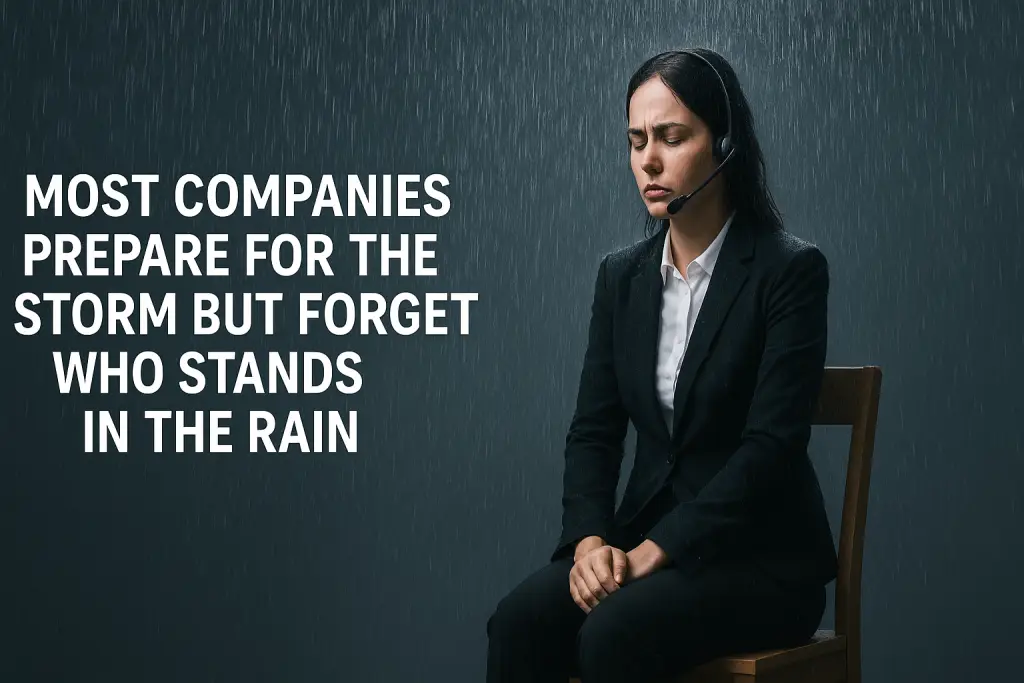Your customers will panic.
Your frontline will absorb it.
Last week I noticed five figure loss in my superannuation balance (which is like a 401K in the US). Thanks to the instability in the share market. But my mind didn’t go where most investors’ minds go when they have a negative return.
It reminded me of something I had learned 4 years ago, during Covid.
Most companies focus on preparing for or recovering from the storm. But they forget who stands in the rain. When crisis hits—returns on investments and Superannuation balances fall, markets crash, financial hardship spreads—what happens?
Well, here is an example of what happens
She took off her headset, walked into the break room…and cried. No one saw it. She wiped her face, went back to her desk, and took the next call.
She takes 20 more calls like it that day – people angry! desperate! condescending!
People were desperate to withdraw money from their superannuation, after all the saw it as their investment. They suddenly had no income, but still had loan repayments and getting “their” money out needs to happen now. They didn’t want to hear about government policies and procedures.
She had no idea how to de-escalate and her own emotional wellbeing is being sacrificed for her job.
Another member (customer). Another wave of stress. Another financial meltdown that that she did cause, and wasn’t her problem to fix — but somehow, she is made feel like she should.
That’s what crisis really looks like on the frontline for the staff bearing the brunt of customer frustration.
Four years ago, I saw this story firsthand when a Superannuation firm asked me to help their staff deal with members who were angry, panicked and were taking it out of the phone agents. They were empathic and concerned enough about the emotional toll it was having that they asked me to train their Client Experience Agents in emotional resilience and recovery techniques. They enthusiastically accepted my suggestion to train their agents on how to de-escalate too.
A crisis can take many forms, negative investment returns, news articles about conduct of someone in the company, system outages or staff lay offs that take the full attention of senior leaders.
What about the people who actually have to deliver that experience in a crisis? Most customer experience training and coaching just isn’t preparing client experience agents for what may be about to hit. And, if like me you see the storm clouds forming, now is the time to act.
Get your frontline teams ready.
To take 30 distressed calls a day from anxious customers or members.
To absorb financial stress and frustration from people worried about their future.
To be calm, kind, and helpful—even when they’re hurting and stressed too.
These people aren’t just dealing with customers.
They’re absorbing emotion. And if they’re not trained, not supported, and not emotionally equipped—it takes a toll.
And here’s the hard truth:
Most training doesn’t prepare them for this.
We teach process, policy, and compliance.
But we don’t teach people how to deal with emotional intensity.
We don’t help them manage their own state before, during, and after those conversations.
With a global recession looming, and growing pressure on financial services—especially superannuation and investment firms—this isn’t optional anymore.
It’s time to invest in emotional capability.
It’s time to train your frontline to manage member and customer emotions and their own
It’s time to prioritise wellbeing as a performance strategy.
Because no matter how good your crisis responses are, it’s the human on the other end of the phone who defines the member experience.
So are your frontline staff ready for a crisis?

